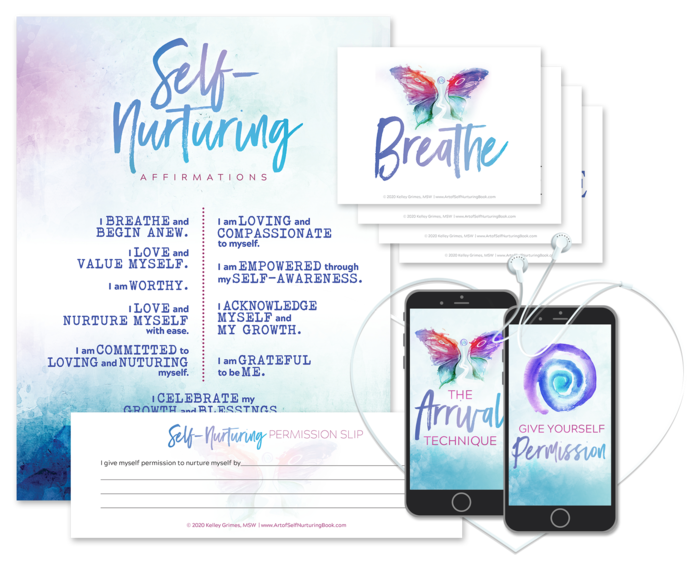
“Stress is not what happens to us. It’s our response TO what happens. And RESPONSE is something we can choose.” ~Maureen Killoran
Adjusting to life’s continual changes can be profoundly stressful. Whether we are experiencing changes in our own lives, the life of someone we love, or the world, we often respond first by feeling stress. When we are stressed, it is so difficult to remember that we have a choice. Most of us feel overwhelmed and out of control with the next change that occurs before we have even accepted the last one. And when we respond to ongoing changes in our lives with stress, we may feel like life is happening to us rather than feeling empowered to make intentional choices. We may even feel like we are on a hamster wheel spinning and spinning, yearning for more joy and meaning in our lives, and fearing what the next change will bring.
Learning to navigate change can be difficult. For many of us our confidence dips in the face of change feeding our anxious thoughts that we can’t handle another challenge. How we react to stress can become imbedded in our nervous system so that any perceived stressful experience can activate the fight/flight part of our brain sending a cascade of cortisol, adrenaline, and glucagon throughout our bodies. Since most of us freeze instead of fighting or fleeing, these chemicals the brain released can not support us and instead leave us feeling nauseous, with our hearts beating rapidly, our blood pressure increased, feeling anxious and emotional, lowering our immune systems, and experiencing even more stress. We may continue to feel unsettled mentally, emotionally, and physically until we learn how to navigate this new unknown. The impact of living in chronic stress can wreak havoc on our physical and mental health and leave us feeling more and more out of control.
And yet change is one thing we can count on throughout our lives. We change as we age. We change as we grow. We change as we adjust to life without loved ones. As long as we are living we are changing. Losing our center every time we experience another stressful change can leave us feeling ungrounded and fearful. After living through a collective time of so much change, most of us have experienced the painful impacts of living in chronic stress. I am here to remind you that we can choose another way. The art of self-nurturing is truly the antidote to the stress of our times.
As we develop an on-going practice of self-nurturing we learn to recover from stress quickly rather than suffering in a state of chronic stress. Nurturing ourselves provides a reserve of energy and a perspective that allows us to make empowered choices rather than reacting to every change from the fight/flight area of our brain. Learning to tend and befriend our experience of change grounded in self-nurturing allows us to respond to change with self-compassion, self-awareness, self-confidence, and self-love.
Here are five strategies to cultivate self-nurturing practices as an antidote to stress:
1.Mindful Pause
Give yourself the gift of a mindful pause throughout the day to breathe and check in with how you feel and what you need with self-compassion and curiosity. Ask yourself what would the most nurturing thing for me to do for myself in this moment be. Cultivating a practice of being in touch with yourself will allow you to notice how stress is impacting you and provide space for you to make empowered and nurturing choices to transform the stress before it gets out of control. To support you in making this a practice, put an alert on your calendar throughout the day to encourage regular mindful pauses.
2.Manage Your Stress
When you notice that your stress is creeping up, take a short break to nurture yourself and intentionally allow your nervous system to recover. Create a self-nurturing practice list including activities that help relieve stress. This list may may include taking a short walk, moving your body, breathing intentionally, stretching your muscles, using positive affirmations, naming three things you are grateful for, setting a boundary, playing music, and/or calling a friend for support. The more you manage your own stress, the less other people’s stress will overwhelm you and the more you will be able to help to create a more peaceful environment from the inside out. You have the power to bring your grounded energy to whatever you are doing and improve the situation.
3.Embrace Joy
Joy is the antidote to overwhelm and exhaustion and helps to transform stress with ease and grace. Take a moment to think about what brings you joy. Remember it can be a small thing like enjoying a lovely cup of coffee or tea, sitting outside in the sun, watching the sunrise and/or sunset, spending time with someone you love, allowing yourself to laugh with wild abandon, thinking about what you are grateful for, doing something inspiring or creative, or simply smiling and allowing your cares to float away for the moment. Now that you have identified what brings you joy, how could you schedule that in your day to fill up your reserves regularly? Scheduling joy is a powerful way to prioritize your health and wellbeing and to make an intentional decision to transform stress and thrive.
4.Recognize Success in Small Ways Each Day
Our overflowing “To Do” lists can create so much added stress in our days feeding our unrealistic expectations of ourselves and the feeling that we have never done enough. You can transform this stress by getting clear about what success looks like and starting to acknowledge your efforts and the steps you have taken every day. Instead of focussing on your “To Do” list at the end of the day create a “Done” list. Acknowledging yourself is a deeply nurturing practice that helps you cultivate resilience and focuses your brain on what is going well instead of what is not. You can deepen this practice by including gratitude after you acknowledge each small success.
5.Connect in Community
A really powerful self-nurturing strategy to transform stress is to find ways to cultivate a sense of belonging and community regularly. Knowing that we are not alone and that other people are there to support us can give us hope and inspiration. Finding communities where we can be our authentic selves and ask for help is healing and supportive. We have the power to create self-nurturing communities where we encourage each other to transform our stress with self-nurturing practices. Where could you connect with people who support and uplift you?
These five strategies will support you in navigating all of the on-going changes in your life and the resulting stress with ease and grace. Learning to treat yourself like your own best friend will support you in deepening your self-compassion, self-awareness, self-confidence, and self-love. You have the ability to transform stress into peace, joy and meaning with regular self-nurturing practices. At any time you can pause and tune into yourself and ask what would be the most nurturing thing I could do for myself in this moment?
May you embrace the art of self-nurturing, your ultimate antidote to stress, as you nurture peace in the world from the inside out!
Sending you so much peace, love and gratitude, Kelley



